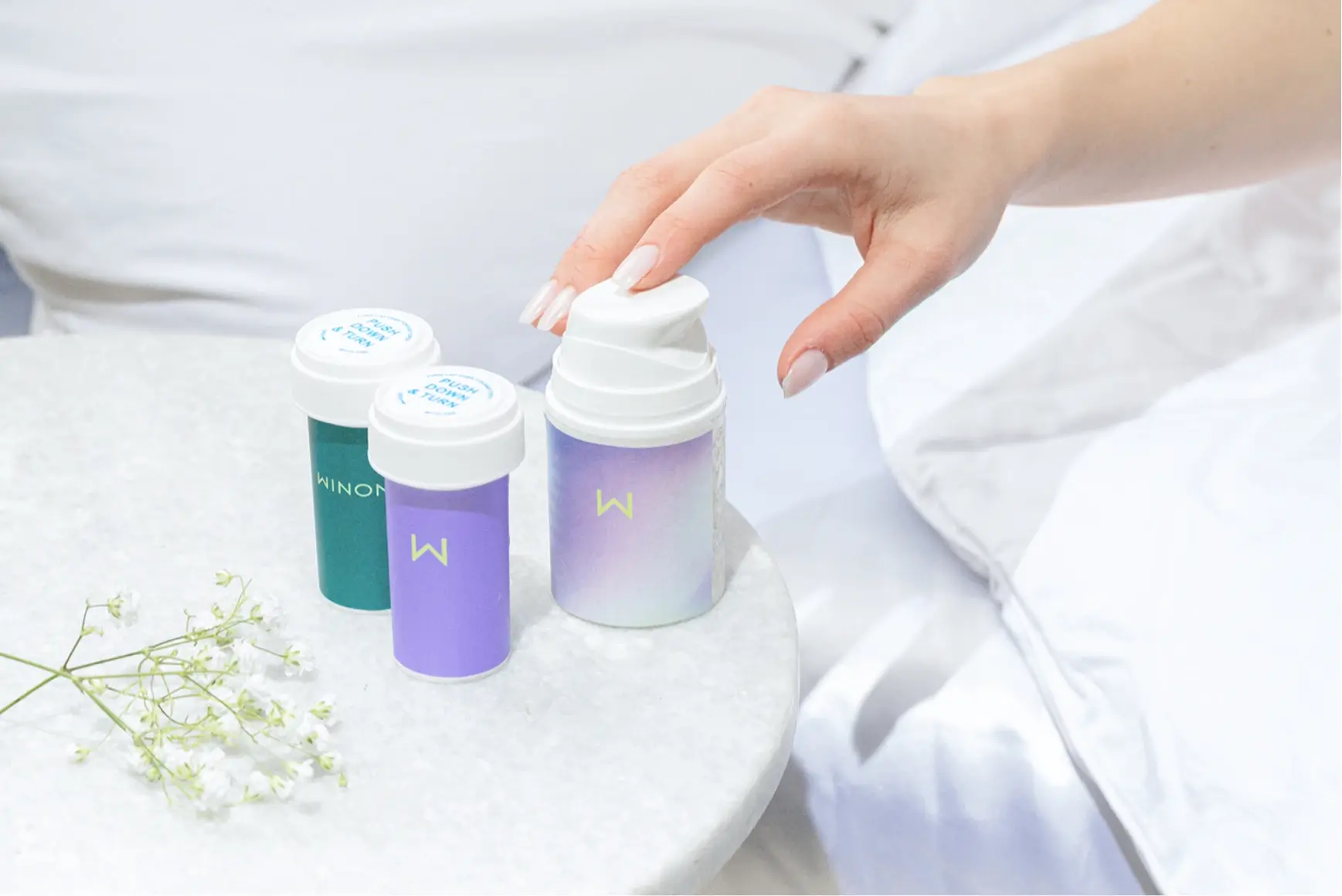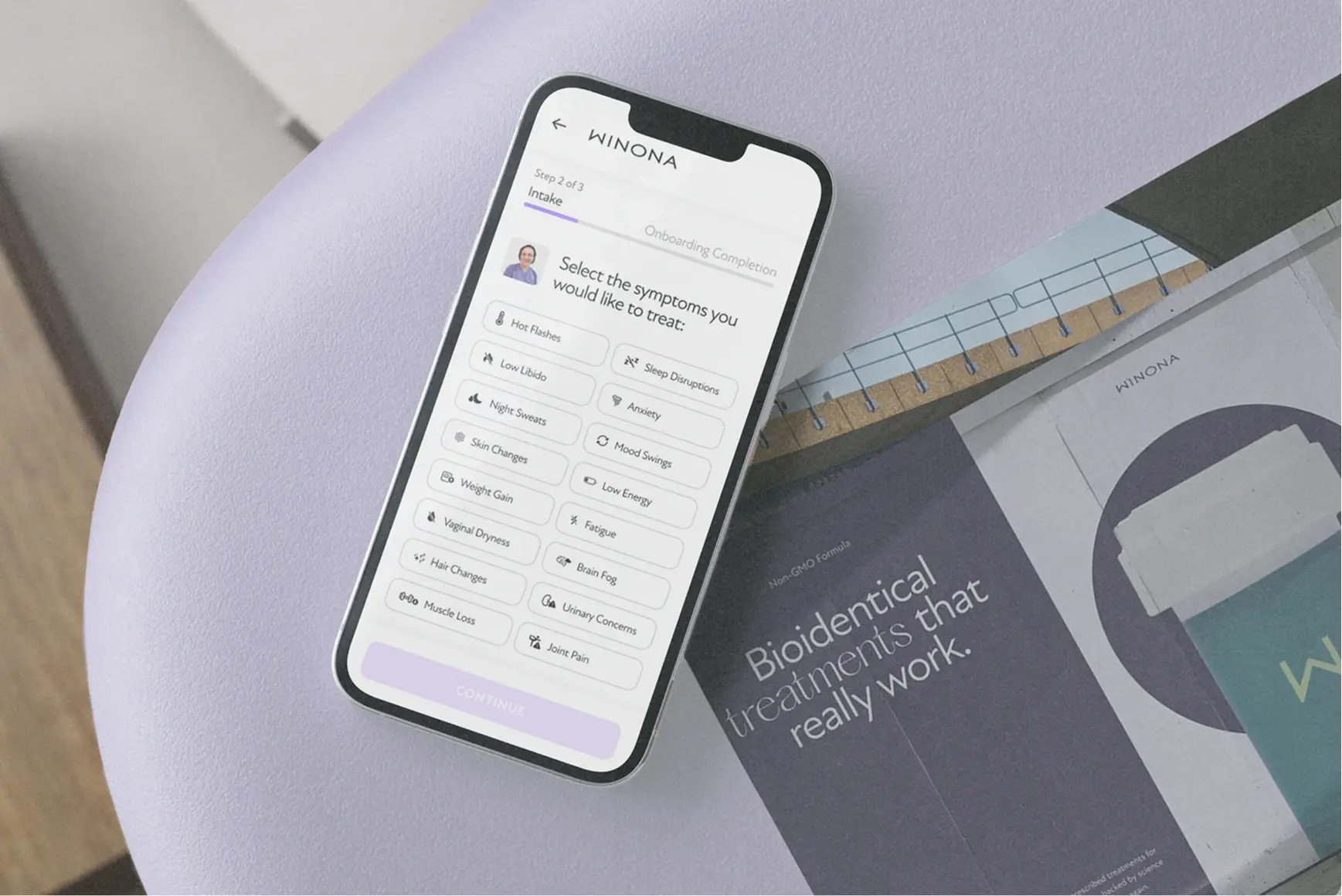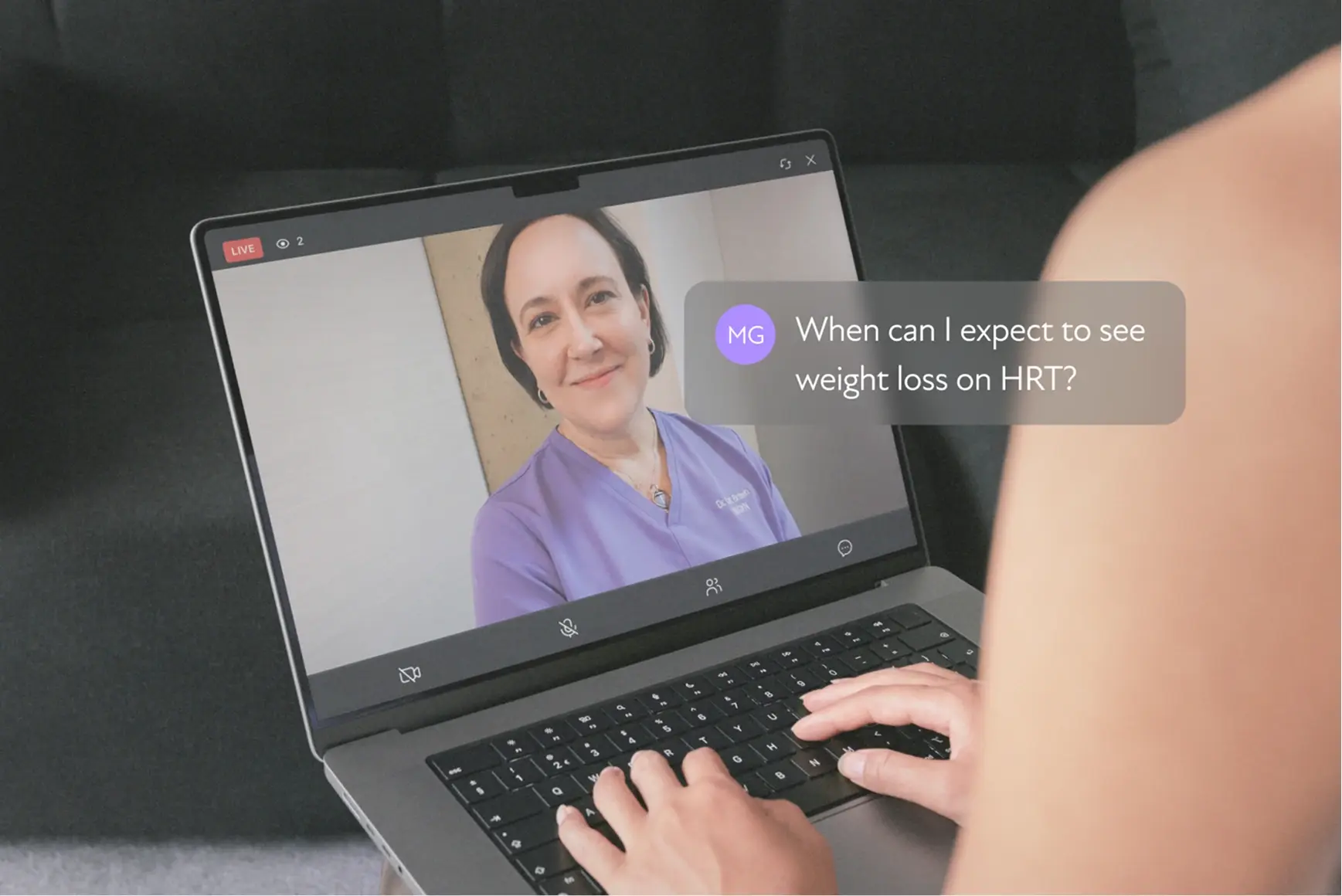At Winona, we believe community support is key to achieving our mission of empowering women with holistic, comprehensive resources beyond telehealth care. An extension of this mission, the Winona Women's Group is a dedicated online space for women to find mutual support and connection in menopause. While many group members are Winona patients, all women are welcome.
Through this study, our aim was to understand the real-life challenges women face in menopause, the impact of HRT and telehealth support, and most significantly, how participating in the Winona Women's Group influenced well-being. We gathered insights from 92 Winona patients, utilizing surveys and direct feedback to examine key themes including symptom experiences, HRT effectiveness, telehealth convenience, and the impact of community support.
How Connection Heals: The Role of Community Support, HRT, and Telehealth in Menopause Care

I. Introduction
II. Participant Background
Our diverse participant group reflected a broad spectrum of menopausal women. Participants ranged in their current phase of the menopause transition (perimenopause, menopause, and postmenopause), age (from 30s-60s), and type and severity of symptoms. Participants also reported how menopause impacted their varying lifestyles and experiences, from caregiving as a parent or grandparent to managing careers in diverse fields and levels of seniority.
This broad representation highlights that the challenges of menopause impact women for a significant portion of their lives, and that community support is vital throughout the entire menopause experience. Participants candidly shared how their personal and professional lives were changed by accessible treatment, effective care, and connection with women navigating similar challenges.
III. Symptom Onset and Impact

For many women, the onset of menopausal symptoms was often a confusing and isolating experience. A significant 56% of participants were surprised by symptoms they hadn't initially linked to menopause, highlighting a widespread lack of awareness about the full spectrum of changes. This often led to misdiagnosis or prolonged suffering.
Before seeking treatment, 54% of participants reported their symptoms had worsened, indicating a progressive intensification of discomfort and daily disruption. This pre-treatment phase underscored the critical need for accessible, informed, specialty care.

The daily toll of untreated symptoms was evident in our findings, demonstrating the pervasive impact on physical, emotional, and cognitive function. 65% of participants reported that their sleep was significantly affected by symptoms. 61% noted a decline in their energy levels, with 59% experiencing challenges managing daily tasks and professional responsibilities.
Mental health was a concern for 58% of participants, including mood swings and heightened feelings of anxiety or depression. This impact extended beyond participants alone, with 45% reporting that symptoms negatively impacted their relationships.

When asked about their most disruptive symptoms, participants highlighted specific challenges. Hot flashes (51%), brain fog (43%), and fatigue (39%) were most commonly reported as the top disruptive symptom. Just over half of participants (53%) reported changes to their weight, metabolism, and body composition, a common and often frustrating symptom of the menopause transition. Similarly, 49% of women shared about libido changes, with 44% reporting its impact on their relationships and comfort during intimacy. Vaginal health overall was a concern for 48% of participants. Joint or muscle pain affected 43% of participants, and 42% reported how pain hindered mobility and overall activity levels.
These deeply impactful symptoms often go unaddressed, causing silent suffering. The experiences reported emphasize how menopause extends beyond personal health circumstances, also changing relationships, workplace performance, and overall quality of life.
IV. Journey with HRT

Winona's bioidentical hormone replacement therapy (HRT) works by replenishing declining hormone levels in menopause, providing much-needed relief for both physical and mental symptoms. When asked to describe their experiences before starting HRT with Winona, participants overwhelmingly reported dealing with persistent symptoms that traditional care models struggled to address effectively.
Those who sought care from in-person providers frequently felt dismissed or misunderstood. Many participants were told their symptoms were just an expected part of aging they had to endure. Others mentioned long wait times, inconvenient appointment schedules, and a notable lack of menopause-specific care.

The decision to begin HRT treatment with Winona was a pivotal turning point for participants. When surveyed about their results, 50% noticed positive changes within weeks, and 40% in just days. The remaining 10% reported results in months, solidifying HRT's efficacy in providing swift initial relief, with a gradual onset of full benefits over a slightly longer period.
Fatigue, sleep challenges, and mood swings showed rapid and impactful improvement. 46% of women reported an increase in energy as the first noticeable change. 45% of participants first experienced better sleep, while 41% reported mood stability as the first improvement. Symptoms like weight gain and hair or skin changes were most likely to improve gradually, aligned with the body's natural cycles. These significant improvements demonstrate the profound and often immediate difference that well-managed, personalized HRT treatment plans can make in the quality of life for women in menopause.

After participants continued their HRT treatment beyond its initial few months, a remarkable 89% reported a consistent improvement in their symptom relief and overall health. As participants proceeded, they described feeling ongoing relief and finding greater stability in their personal and professional lives. Many reported this continuous improvement in symptom management as a key factor in their renewed sense of well-being and confidence. These transformative experiences highlight the importance of ongoing, tailored menopause care focused on sustained positive outcomes.
V. Telehealth Experience

Accessibility to HRT was a major barrier for many before they found Winona. A striking 68% of participants reported that Winona's care methods specifically made HRT more accessible for them. This resounding endorsement highlights the convenience and reach of telehealth for menopause care, removing significant geographical and logistical hurdles.
Many participants first heard about HRT through online searches or word-of-mouth, often after frustrating experiences with traditional in-person care. The preference for telehealth consultations over traditional in-person visits was evident, as it offered participants greater convenience and reduced travel time, while allowing for consultations from the privacy and comfort of their homes.

Winona's telehealth service was overwhelmingly seen as a positive and beneficial experience. The majority of participants described feeling supported by their Winona doctor. Convenience, accessibility, and thoroughness were key themes in how participants recounted their experiences. A notable 98% reported they would recommend Winona, with many stating they had already done so.
This high level of perceived support indicates the benefit of Winona's virtual care model, which includes an online Patient Portal, 24/7 doctor messaging access, and the ability to access ongoing support and adjustments. Participants described a strong sense of attentiveness and dedication from their doctors, indicating that effective, supportive care is not limited by physical proximity.
VI. Community Influence

The Winona Women’s Group, a private Facebook community, allows women in menopause across the US to connect, discuss their experiences, and share encouragement. Across all levels of reported engagement in the group (very active, somewhat active, or rarely active), participant sentiment was highly favorable.
More than half of the women who were active in the group indicated they found community support helpful, especially early on in their menopause or HRT journeys. Participants frequently cited examples of finding profound connections, receiving practical advice, and experiencing validation from women facing similar challenges. These experiences signify how community support strengthens emotional well-being and informed decision-making.

Having access to this collective space helped alleviate feelings of isolation and normalized discussions around what is often a stigmatized and misunderstood phase of life. When recounting their experiences in the group, participants across all stages of the menopause transition resoundingly reported feeling validated, less alone, and more clear about their own symptoms.
Multiple participants recounted how reading other women's success stories empowered them to finally seek treatment and regain control of their own health. Peer-to-peer exchanges in the Winona Women's Group resulted in learning opportunities, encouragement, and real-world positive change, highlighting the critical need for community and space for vulnerable conversations around menopause.
VII. Advice for Others

When asked to report on their experiences with HRT, telehealth, and the Winona Women's Group, participants also shared valuable advice for other women considering their options in menopause. 98% of participants would recommend telehealth to women seeking menopause care, citing convenience and access to dedicated menopause specialists. 65% of participants recommended HRT as a solution to symptoms, with many emphasizing its effectiveness and options for personalization.
The vital impact of community support was also clear. 82% of Winona Women's Group members enthusiastically recommended joining a community like Winona's for essential learning opportunities and validation.
When asked to share their perspectives with women hesitant to try HRT, many emphasized the transformative relief they found. Participants frequently stressed the importance of seeking professional guidance, trusting their instincts, and, crucially, not settling for unnecessary discomfort.
VIII. Conclusion

Candid experiences shared by a diverse group of women across the menopause transition affirm Winona's holistic approach to care. The combination of personalized HRT treatment, convenient telehealth service, and involved community support significantly improves the quality of life for women navigating menopause.
Participants receiving HRT treatment experienced substantial and often rapid improvements in a wide range of symptoms, from debilitating hot flashes and sleep disturbances to challenging mood swings and brain fog. The accessibility and convenience of telehealth proved paramount, removing significant barriers to effective care. Simultaneously, the Winona Women's Group alleviated the loneliness all too common in menopause, replacing isolation with emotional validation, practical advice, and a crucial sense of belonging.
Participant feedback suggests a strong and urgent need for continued education among healthcare providers treating menopausal women, as well as the expansion of supportive community resources beyond symptom care. Findings suggest a clear and compelling path forward for improving menopause care: integrating personalized, accessible treatment with strong community support.

Winona's approach not only addresses immediate symptoms but also fosters a sense of empowerment, reduces stigma, and promotes sustained positive outcomes. The testimonials and data collectively paint a picture of women reclaiming their vitality, confidence, and well-being. This diverse range of experiences demonstrates that, with the right resources, menopause does not have to be a period of decline, but rather a rewarding and fulfilling life transition that can be navigated with comfort, clarity, and control.